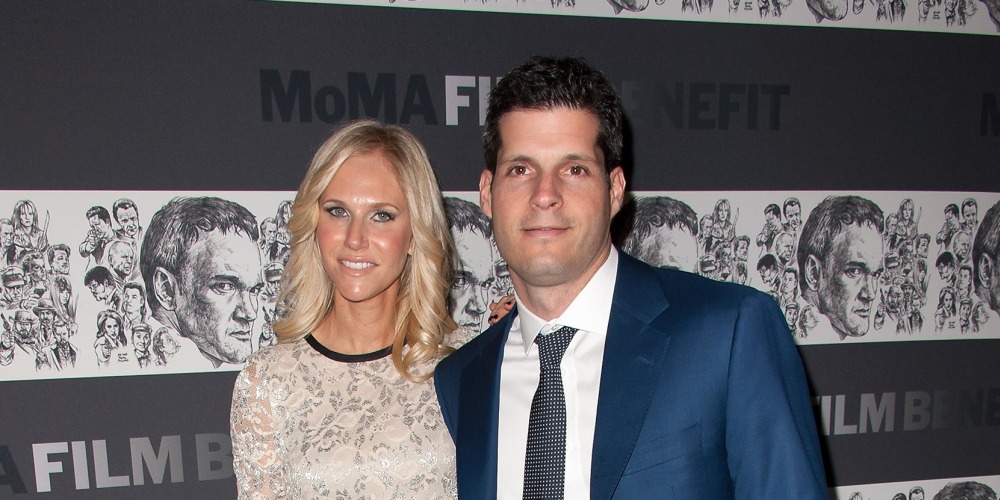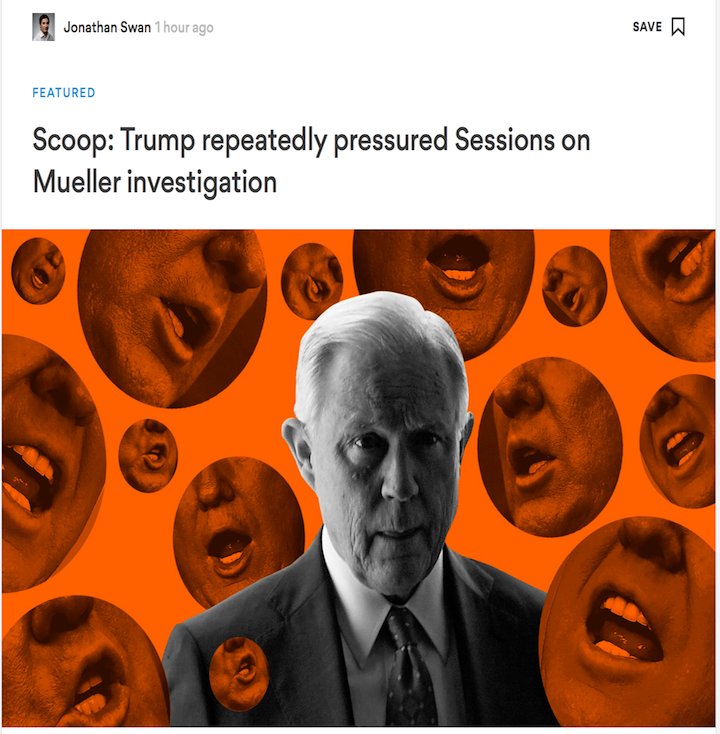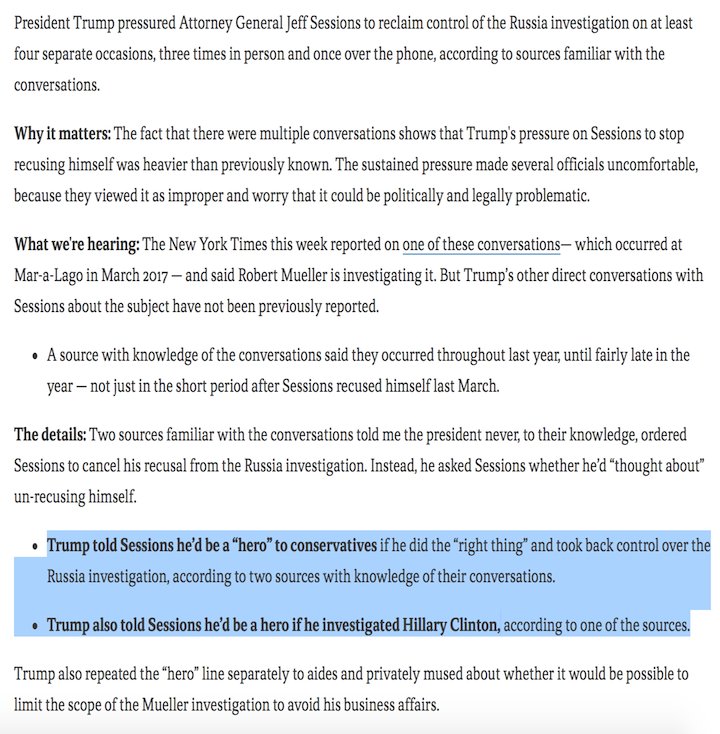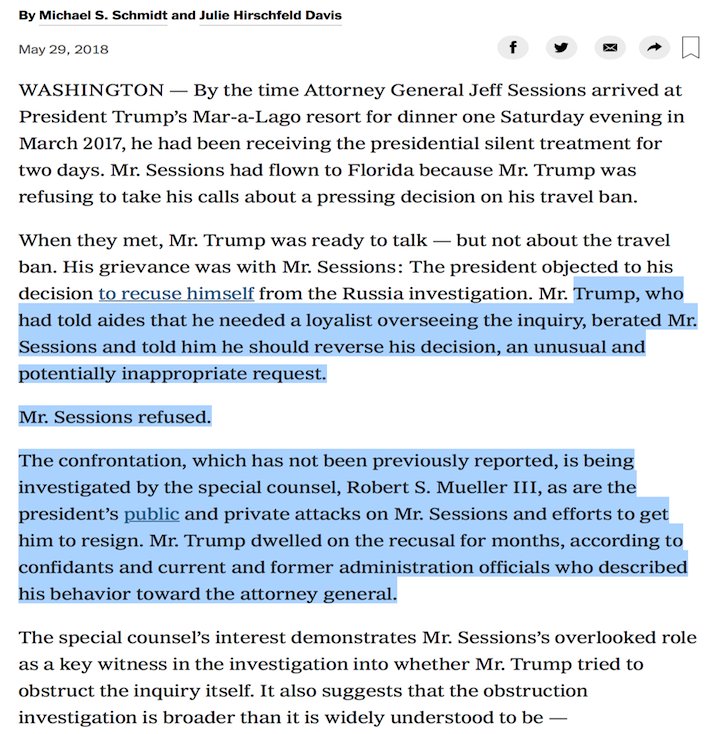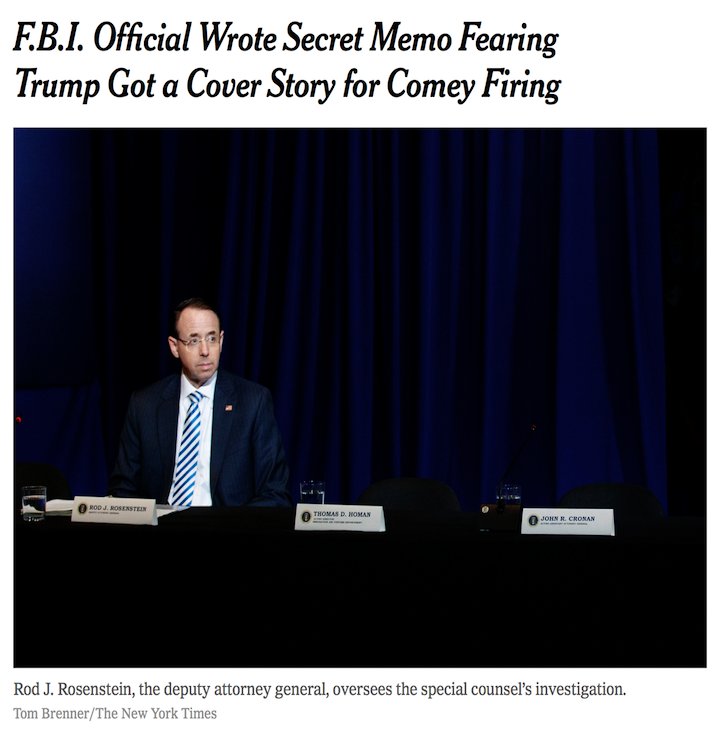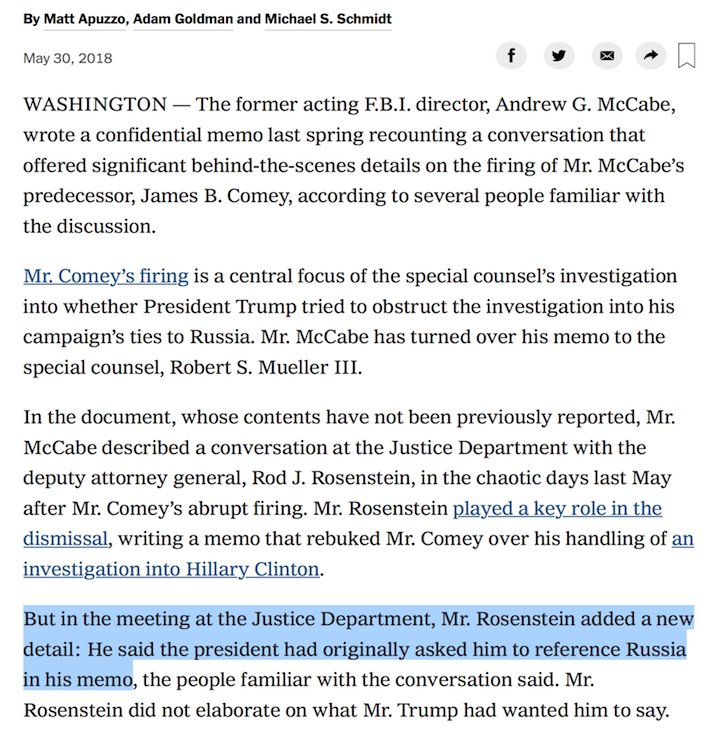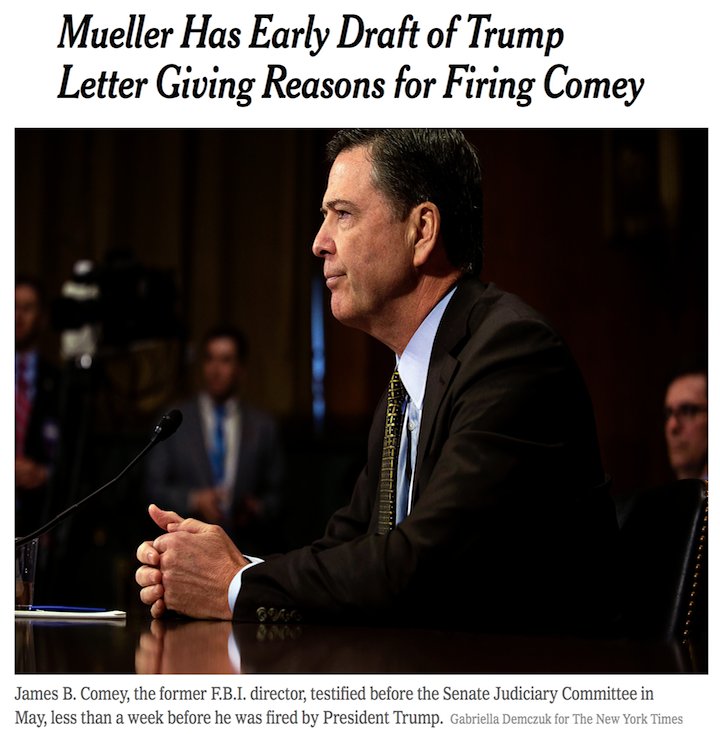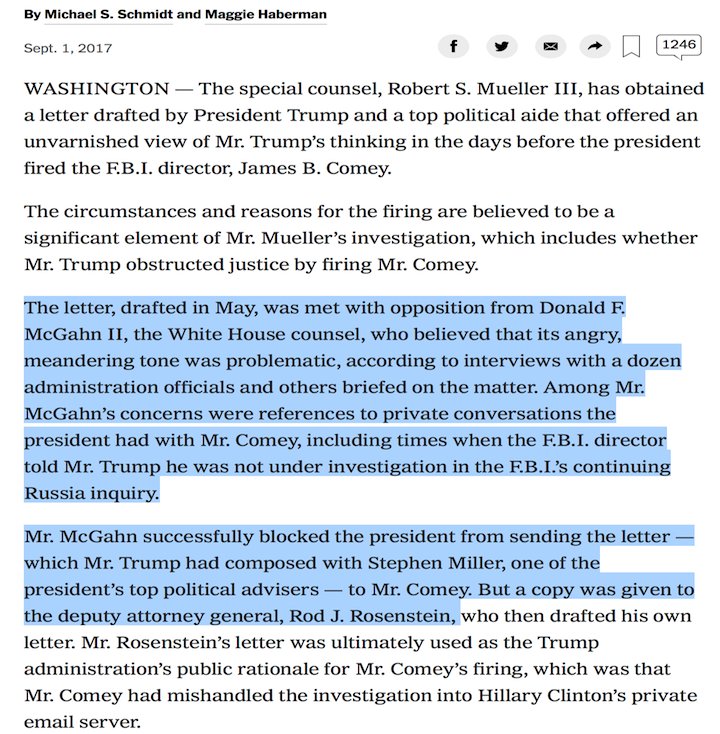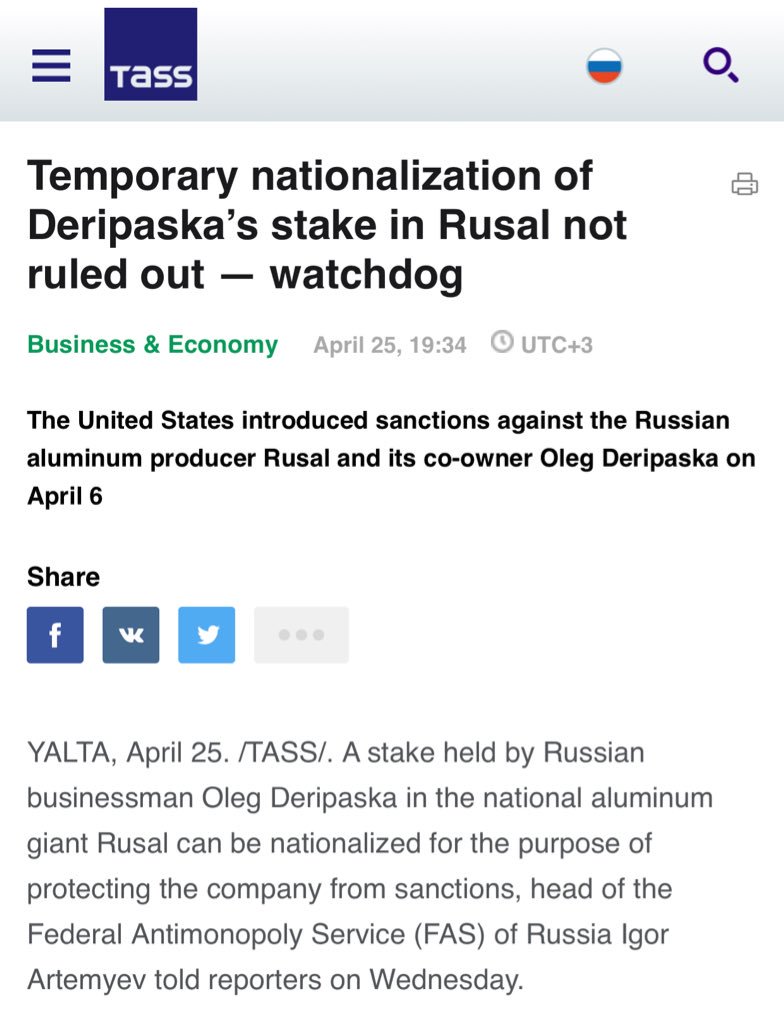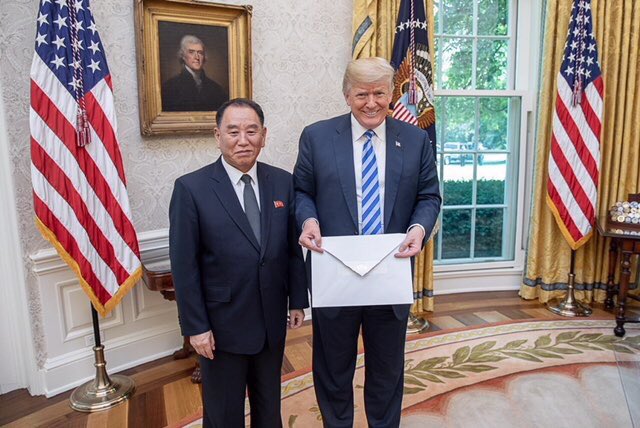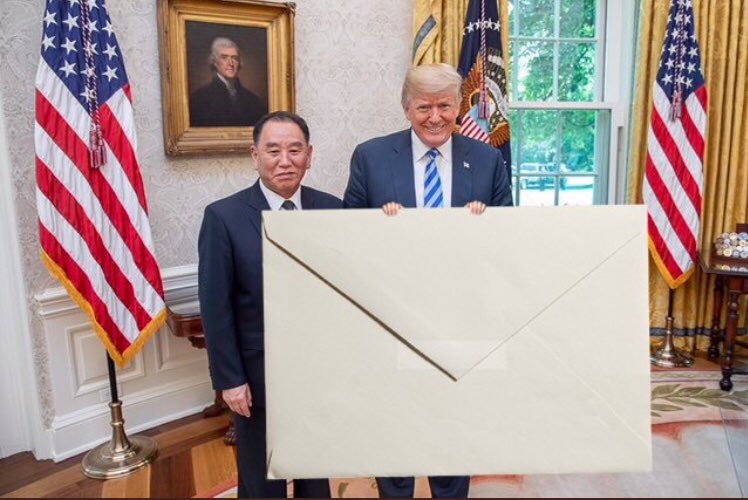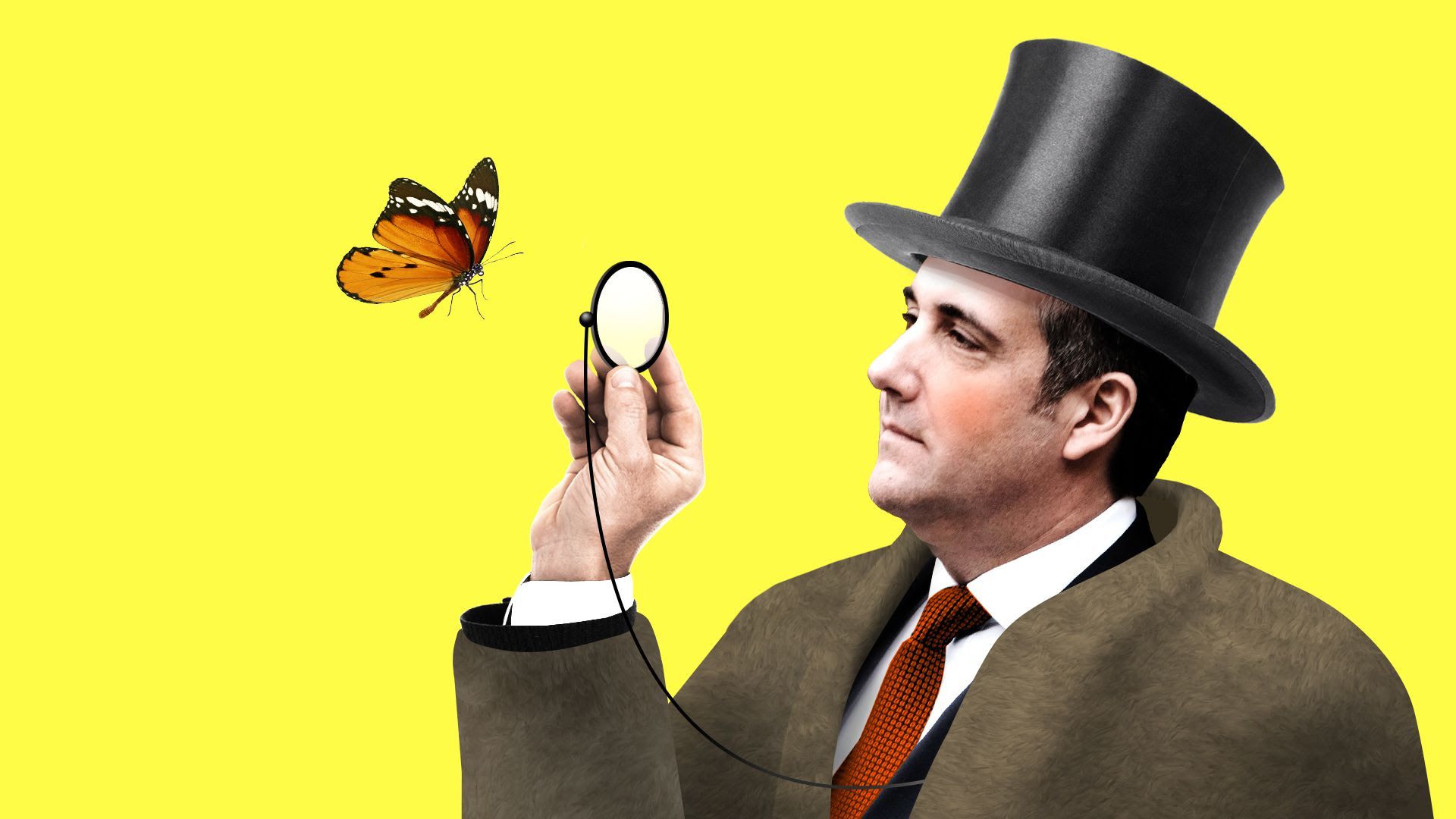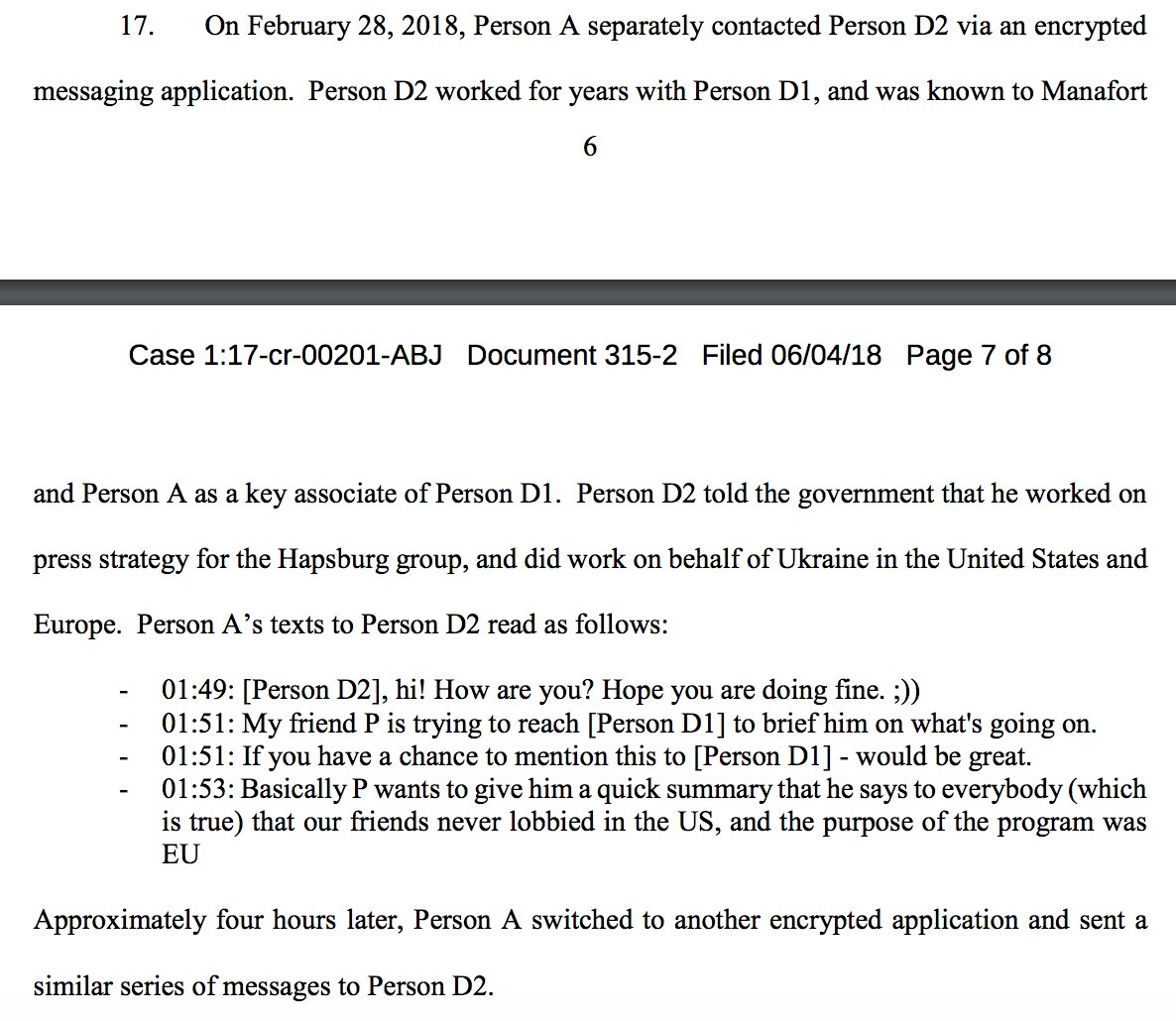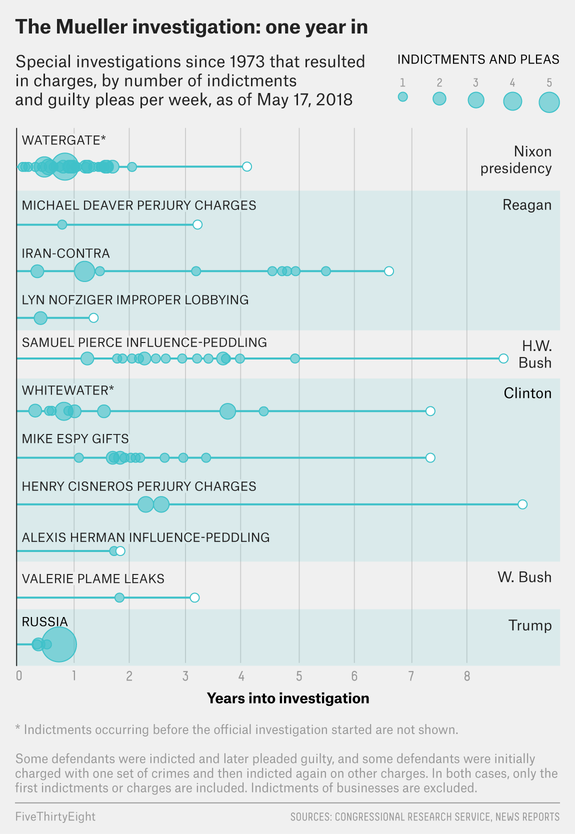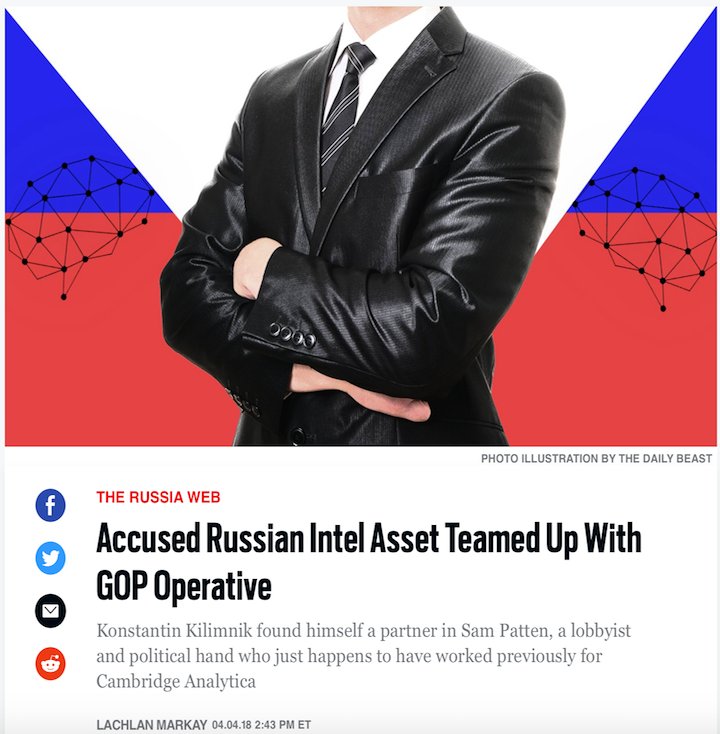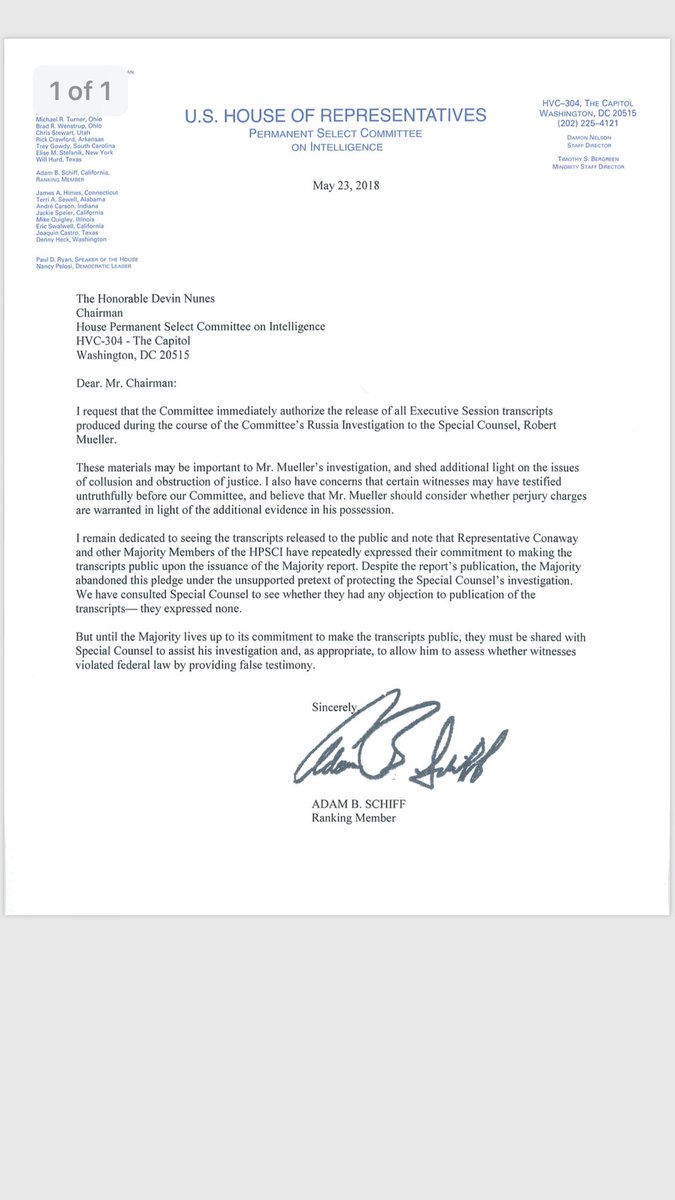THE GIANT HOLES IN TRUMP’S MIKE FLYNN STORY POINT TO “COLLUSION,” NOT OBSTRUCTIONJune 3, 2018/6 Comments/in 2016 Presidential Election, emptywheel, Mueller Probe /by empty wheel
I wanted to look more closely at the story the President’s lawyers told Mueller’s team about Flynn’s firing in January, both for what it reveals about the White House’s response to the Sally Yates warning, and for its claims about how it interprets DOJ actions. The letter reveals the following:
* The White House claims, Sally Yates’ public comments (which they entirely ignore) to the contrary, that they got DOJ permission to release the Mike Flynn intercept; given the timing of the story as laid out, and Trump’s question about FBI leaking, I actually think it possible if not likely that the White House was a source for the February 9 story leaking the intercept. If that’s true, it totally undermines the Trump letter.
* Don McGahn wrote a memo on the lead-up to Flynn’s firing two days after the firing, and one day after Trump’s “let it go” conversation with Jim Comey. It appears to be inconsistent with Transition materials, particularly an email showing (among other things) that Reince Priebus knew in real time what Flynn told Kislyak on December 29. Firing Comey would have been an effort to prevent FBI from discovering those transition period communications.
* The Trump letter didn’t address two of the questions asked about Flynn’s firing. In addition to remaining silent about what Trump really knew about what Flynn said to Pence, it doesn’t address Trump’s involvement in the transition period communications with Sergey Kislyak. That’s important because that’s the question that Flynn’s initial interview should have revealed. Contrary to what the letter claims, then, Flynn’s plea and Trump’s silence in the letter about the substance of the plea is proof not that Trump didn’t obstruct, but that Trump continues to refuse to explain why Flynn asked Kislyak to hold off on responding to sanctions, to say nothing of whether Flynn did so on his orders.
The section (less the Comey and McCabe testimony) and associated footnotes follow, with my comments.
MUELLER ASKED FOR SIX FLYNN RELATED THINGS; TRUMP ONLY RESPONDED TO FOURHere are the things Mueller asked Trump to explain pertaining to the Flynn firing.He said
1. Former National Security Advisor Lt. Gen. Michael Flynn — information regarding his contacts with Ambassador Kislyak about sanctions during the transition process;
2. Lt. Gen. Flynn’s communications with Vice President Michael Pence regarding those contacts;
3. Lt. Gen. Flynn’s interview with the FBI regarding the same;
4. Then-Acting Attorney General Sally Yates coming to the White House to discuss same;
5. The President’s meeting on February 14, 2017, with then-Director James Comey;
6. Any other relevant information regarding former National Security Advisor Michael Flynn;
In our most recent meeting, you mentioned the possibility of obstruction in connection with the case of former National Security Advisor and Lt. Gen. Michael Flynn (Ret.) “Lt. Gen. Flynn”), and that you desired to speak with the President specifically regarding his conversation with then-Director Comey one day after the President fired Lt. Gen. Flynn for lying to the Vice President.
Note, at the outset, how Trump’s lawyers have taken 6 questions about the specifics of communications about Flynn and turned that into a question that focuses on the meaning of the February 14 “Let it go” meeting? So as you’re reading the following, watch how Trump’s lawyers redefine the scope of the questions — I’ll revisit this at the end.
Also as you read this, remember that this response happens in the wake of (and may be the first meeting after) Mike Flynn flipping in part because Jared Kushner hung him out to dry in testimony.
You have already been provided the testimony of White House Counsel and his extensive internal file memo as well as the testimony and notes of the President’s Chief of Staff, Reince Priebus “Mr. Priebus”), and other members of the White House Counsel’s office.
Again, Mueller has asked specifically about Flynn’s comments to Pence. Pence is not included here.
TRUMP COMPLAINS THAT MUELLER HASN’T TURNED OVER COMEY’S MEMOS; THE MEMOS SERIOUSLY UNDERMINE SOME CLAIMS MADE IN THE LETTERAccording to former Mr. Comey, the following occurred at a February 14, 2017, meeting between him and the President:
The President then returned to the topic of Mike Flynn, saying, “He is a good guy and has been through a lot.” He repeated that Flynn hadn’t done anything wrong on his calls with the Russians, but had misled the Vice President. He then said, “I hope you can see your way clear to letting this go, to letting Flynn go. He is a good guy. I hope you can let this go.” I replied only that “he is a good guy.” … I did not say I would “let this go.”16
The White House denied and refuted that the President said these words to Mr. Comey.17 We decline to recommend to the President that he be interviewed on this subject for many reasons.
16 We note that you have declined our request on several occasions to share the classified notes of Mr. Comey, which have been leaked to the press and given to members of Congress and publicly disclosed. As Chief Executive Officer, the President has every right to have them. You provided them to While House Counsel. In addition, we note that Mr. Comey has had to correct his testimony on multiple occasions.
17 See infra p. 11 and n. 30.
One of the questions added to Sekulow’s list in March addressed Trump’s tweet suggesting there might be recordings of this meeting, which makes this response all the more interesting. In any case, you’ll see that in January Trump’s lawyers made a number of claims that Comey’s memos solidly refuted.
I’m also confused by the apparent contradiction — both the demand that Mueller turn over Comey’s memos (I’ll return to what Mueller was likely withholding in a bit) followed by the claim that he has given them to Don McGahn.
THE SOURCES CITED FOR CLAIMS ABOUT FLYNN DON’T SUPPORT THOSE CLAIMS AND HAVE SINCE BEEN UNDERMINED FURTHERWhat follows is a non-exhaustive list:
First, the President was not under investigation by the FBI;
Second, there was no obvious investigation to obstruct since the FBI had concluded on January 24, 2017, that Lt. Gen. Flynn had not lied, but was merely confused.18Director Comey confirmed this in his closed-door Congressional testimony on March 2, 2017.19
18 Evan Perez, Flynn Changed Story to FBI; No Charges Expected, CNN (Feb. 17, 2017)
19 The Editorial Board, The Flynn Information, WALL STREET JOURNAL (Dec. I, 2017) “A Congressional source also tells us that former FBI director James Comey told the House Intelligence Committee on March 2 that his agents had concluded that Mr. Flynn hadn’t lied but had forgotten that had been discussed.”).
I suspect the first of these bullets — that the President was not under investigation — will come back to haunt him. That is, Trump wasn’t investigation yet in part because by firing Flynn he separated the investigation that would soon subsume him, in part because of his own role in the actions Flynn was fired for.
As for the claims about Flynn. First, notice that the first source Trump’s lawyers cite doesn’t support their claims. The story says nothing about Flynn being confused. Rather, it says that, when challenged, Flynn claimed not to remember.
Flynn initially told investigators sanctions were not discussed. But FBI agents challenged him, asking if he was certain that was his answer. He said he didn’t remember.
The FBI interviewers believed Flynn was cooperative and provided truthful answers. Although Flynn didn’t remember all of what he talked about, they don’t believe he was intentionally misleading them, the officials say.
In addition, the CNN story cited notes that the investigation was only done, “barring new information that changes what they know.” A lot would transpire in the weeks after that story, including disclosure of a meeting at which sanctions were raised, that would change how Flynn’s skilled lying looked after the fact.
The second source isn’t any better — it supports the “forgot” claim too. And the GOP HPSCI report makes it clear that even that claim is inaccurate. What Comey said was that the interviewing agents saw no signs of deception.
Director Comey testified to the Committee that “the agents … discerned no physical indications of deception. They didn’t see any change in posture, in tone, in inflection, in eye contact. They saw nothing that indicated to them that he knew he was lying to them.”
From a lifetime intelligence official like Flynn, that’s not that surprising.
TRUMP’S LAWYERS GET THE LAW ON OBSTRUCTION WRONGNote, in the following section, I’m putting the initial bullet, the argument, and the footnotes all together. The footnotes will appear out of order as a result.
Third, as a matter of law, even if there had been an FBI investigation there could have been no actionable obstruction of said investigation under 18 U.S.C. § 1505, since an FBI investigation is not a “proceeding” under that statute. Since there is no cognizable offense, no testimony is required;
To briefly review the relevant law and facts, § 1505 of Title 18, United States Code, as amendedby the Victim and Witness Protection Act of 1982, forbids anyone from corruptly, or by threats of force or by any threatening communication, influencing, obstructing, or impeding any pending proceeding before a department or agency of the United States, or Congress.22Under § 1505, a “pending proceeding” is limited only to agencies with rule-making or adjudicative authority. The investigation of Lt. Gen. Flynn was being conducted by the FBI, which possesses only investigative authority, not adjudicative; it cannot conduct “proceedings” within the cognizance of§ 1505.23No court has ever held than an FBI investigation constitutes a § 1505 proceeding, and the U.S. Attorney’s Manual makes clear that “investigations by the Federal Bureau of Investigation (FBI) are not §1505 proceedings.”24The DOJ has even expressly acknowledged as much to the United States Court of Appeals for the Fourth Circuit.25As a matter of law, then, the FBI’s investigation of Lt. Gen. Flynn was not, at the time of the President’s comments as recalled by Mr. Comey, within the scope of § 1505.
22 In 1996, Congress enacted a clarifying amendment to 18 U.S.C. § 1515, which defines the term “corruptly” as used in § 1505 to mean “acting with an improper purpose, personally or by influencing another, including making a false or misleading statement, or withholding, concealing, altering, or destroying a document or other information.” False Statements Accountability Act of 1996, Pub. L. No. I 04-292, §3, I IO Stat. 3459, 3460.
23 Courts have explained it this way.
24 U.S. DEP’T OF JUSTICE, U.S. ATTORNEYS’ MANUAL: CRIMINAL RESOURCE MANUAL § 1727, PROTECTION OF GOVERNMENT PROCESS – OMNIBUS CLAUSE – 18 U.S.C. § 1505,
25 United States v. Adams, 335 Fed. Appx. 338, 342 (4th Cir. 2009) (Government conceded that criminal investigation by FBI or DEA was not pending proceeding within the scope of 18 U.S.C. § I 505, and requested defendant’s conviction on that count be vacated).
As numerous people have noted (including the NYT in an annotation of this), the President’s crack lawyers get which obstruction of justice statute might be at issue wrong.
TRUMP’S LAWYERS NEVER ADDRESS WHAT SALLY YATES HAS STATED PUBLICLY — WHICH BADLY UNDERMINES THE DON MCGAHN NARRATIVE OF THESE ISSUESThe following section is the one I’m most interested in, because it probably added to the evidence that the White House obstructed. Because this argument is so muddled, I’m repeating the “second” point because it’s necessary to make what follows sensible. Having argued that obstructing an FBI investigation is not obstructing justice, Trump’s lawyers are now going to set out to suggest there was no way they could have known that Flynn was under investigation. (Note, for reasons of length, I don’t deal with Comey and McCabe’s testimony; suffice it to say that Comey’s testimony, including him entertaining the investigation of Trump, reportedly led directly to his firing, so the hearing actually proves the opposite of what the White House claims.)
Second, there was no obvious investigation to obstruct since the FBI had concluded on January 24, 2017, that Lt. Gen. Flynn had not lied, but was merely confused.18Director Comey confirmed this in his closed-door Congressional testimony on March 2, 2017.19
Fourth, both Mr. Comey and Mr. McCabe subsequently testified under oath that there was “no effort to impede” the investigation.20Mr. McCabe’s testimony followed Mr.Comey’s testimony on May 3, 2017, just six days before his termination, that “it would be a big deal to tell the FBI to stop doing something . . . for a political reason. That would be a very big deal. It’s not happened in my experience.”21
The following facts are taken from information voluntarily provided to your office or from information that is publicly available. These facts further demonstrate that the President did not obstruct justice in any manner concerning Lt. Gen. Flynn.
According to Acting Attorney General Sally Yates (“Ms. Yates”), on January 24, 2017, Lt. Gen. Flynn was interviewed by the FBI. According to reports, “The FBI interviewers believed Flynn was cooperative and provided truthful answers. Although Flynn didn’t remember all of what he talked about, they don’t believe he was intentionally misleading them, the officials say.”26
This account of the FBl’s interview and subsequent conclusions was later confirmed by the closed-door congressional testimony of Mr. Comey.27 Mr. Comey also confirmed in his May 3, 2017, Senate Intelligence Committee testimony that he “did participate in conversations about that matter” with Ms. Yates, referring to the FBl’s interview of Lt. Gen. Flynn. before she conveyed the information to the White House in the days that followed.28
26 Perez, Flynn Changed Story to FBI; No Charges Expected, supra n. 18.
27 “A Congressional source also tells us that former FBI director James Comey told the House Intelligence Committee on March 2 that his agents had concluded that Mr. Flynn hadn’t lied, but had forgotten what had been discussed.” The Editorial Board, The Flynn Information, WALL STREET JOURNAL (Dec. 1, 2017).
28 Read the Full Testimony of FBI James Comey in Which He Discusses Clinton Email Investigation, supra n.21.
This repeats what was already said, that the FBI at first came away thinking that Flynn had shown no signs of deception. Trump’s lawyers choose to source these claims to the same CNN and WSJ pieces they had already cited instead of 1) Flynn’s guilty plea 2) Comey’s testimony or 3) what Yates told McGahn. Only after having relied on the press that Trump otherwise demonizes does the letter cite what Yates actually said.
On January 26, 2017, Ms. Yates met with White House Counsel Don McGahn (“Mr. McGahn”). As outlined by Mr. McGahn in his White House Counsel’s Office memo dated February 15, 2017,29“Yates expressed two principal concerns during the meeting: (1) that Flynn may have made false representations to others in the Administration regarding the content of the calls; and (2) that Flynn’s potentially false statements could make him susceptible to foreign influence or blackmail because the Russians would know he had lied.” “Yates further indicated that on January 24, 2017, FBI agents had questioned Flynn about his contacts with Kislyak. Yates claimed that Flynn’s statements to the FBI were similar to those she understood he had made to Spicer and the Vice President.”3029 This confidential and privileged memorandum was provided to your office as part of the White House’s voluntary production, and is identified as SCR002b_SCR002b000000001.30 Recall that Lt. Gen. Flynn had previously been asked questions by other transition team personnel concerning his conversations with Ambassador Kislyak via an email chain of January 12, 2017. See DJTFP00027478. The response provided by Lt. Gen. Flynn was vague, and appears to imply that sanctions were not discussed. DOJ leadership would not advise the White House that transcripts of the calls existed, and of concerns about the content of those transcripts, until January 26, 2017, and even then, when asked by the White House, the DOJ refused to confirm that an investigation was underway.
Three things about this passage. First, whereas elsewhere the letter relies on public testimony (of Comey and McCabe), the letter doesn’t cite Yates’ public testimony. Instead, the White House relies on a narrative that Don McGahn drew up the day after the “let it go” conversation — that is, after such time as Flynn’s firing might be a problem. Here’s what they would have had to include had they actually included Yates’ testimony (which they don’t dispute).
We also told the White House Counsel that General Flynn had been interviewed by the FBI on February 24. Mr. McGahn asked me how he did and I declined to give him an answer to that. And we then walked through with Mr. McGahn essentially why we were telling them about this and the first thing we did was to explain to Mr. McGahn that the underlying conduct that General Flynn had engaged in was problematic in and of itself.
Secondly, we told him we felt like the vice president and others were entitled to know that the information that they were conveying to the American people wasn’t true. And we wanted to make it really clear right out of the gate that we were not accusing Vice President Pence of knowingly providing false information to the American people.
And, in fact, Mr. McGahn responded back to me to let me know that anything that General Flynn would’ve said would have been based — excuse me — anything that Vice President Pence would have said would have been based on what General Flynn had told him.
We told him the third reason was — is because we were concerned that the American people had been misled about the underlying conduct and what General Flynn had done, and additionally, that we weren’t the only ones that knew all of this, that the Russians also knew about what General Flynn had done.
And the Russians also knew that General Flynn had misled the vice president and others, because in the media accounts, it was clear from the vice president and others that they were repeating what General Flynn had told them, and that this was a problem because not only did we believe that the Russians knew this, but that they likely had proof of this information.
And that created a compromise situation, a situation where the national security adviser essentially could be blackmailed by the Russians. Finally, we told them that we were giving them all of this information so that they could take action, the action that they deemed appropriate.
Yates’ public testimony (to which Mary McCord would also be a witness) adds several elements to McGahn’s: she said the sanction discussion itself was wrong (elsewhere HPSCI has claimed she raised Logan Act violations). She talked about concerns about Pence’s credibility (remember–the White House doesn’t address getting Pence’s side of this story at all). And she claims she specifically suggested the White House should take action — that is, fire Flynn.
Finally, note that this passage cites an email chain dated January 12 — what was treated as campaign production with the Bates stamp “DJTJFP.” This is the only time the letter cites that production; they don’t, for example, cite the email chains referenced in Flynn’s plea that make it clear how hard it would have been to forget the Kislyak call because he was basically acting on orders from the President. In any case, the letter remarkably describes nothing about this chain of emails, not even who participated in it. But given the timing, it almost certainly was a response to the January 12 Ignatius story, and therefore was likely a press response chain. It may have also been prep for this all-important Pence appearance.
MCGAHN’S NARRATIVE REVEALS TRUMP KNEW OF THE FLYNN INTERVIEW BEFORE HE DEMANDED LOYALTY FROM COMEY ON JANUARY 27Resuming … This is a detail that has gotten far too little attention. After Yates spoke to McGahn, he had a meeting with Trump and Priebus and others.
On January 26, 2017, Mr. McGahn briefed the President concerning the information conveyed by Ms. Yates. Additional advisors were brought in, including White House Chief of Staff Mr. Priebus. It was agreed that additional information would be needed before any action was taken. As recorded by Mr. McGahn, “Part of this concern was a recognition by McGahn that it was unclear from the meeting with Yates whether an action could be taken without jeopardizing an ongoing investigation.” At that time “President Trump asked McGahn to further look into the issue as well as finding out more about the calls.”
Note how important it is that the letter ignore Yates’ public statements? She claims she suggested the White House should take action, meaning they should fire Flynn. The White House claimed (in a piece written after the “let it go” conversation) that they didn’t know whether they could fire Flynn because there might be an ongoing investigation. And Trump used that as an excuse to get more information on the investigation.
MCGAHN’S NARRATIVE CLAIMS YATES SAID DOJ WOULD NOT MIND IF THE WHITE HOUSE PUBLICLY REVEALED THE INTERCEPT ON KISLYAKWhich is what leads to the January 27 meeting with Yates and McGahn.
On January 27, 2017, at Mr. McGahn’s request, Ms. Yates and Mr. McGahn had another meeting. Importantly, DOJ leadership declined to confirm to the White House that Lt. Gen. Flynn was under any type of investigation. According to Mr. McGahn’s memo:
During the meeting, McGahn sought clarification regarding Yates’s prior statements regarding Flynn’s contact with Ambassador Kislyak. Among the issues discussed was whether dismissal of Flynn by the President would compromise any ongoing investigations. Yates was unwilling to confirm or deny that there was an ongoing investigation but did indicate that the DOJ would not object to the White House taking action against Flynn. (Emphasis added.)
Further supporting the White House’s understanding that there was no FBI investigation that could conceivably have been impeded, “Yates also indicated that the DOJ would not object to the White House disclosing how the DOJ obtained the information relayed to the White House regarding Flynn’s calls with Ambassador Kislyak.” In other words, the DOJ expressed that the White House could make public that Lt. Gen. Flynn’s calls with Ambassador Kislyak had been surveilled. It seems quite unlikely that if an ongoing DOJ investigation of Lt. Gen. Flynn was underway, the DOJ would approve its key investigation methods and sources being publicized.
Key to the White House argument, then, are two details: first, that Yates didn’t confirm for McGahn that there was an ongoing investigation, but also his claim that, “DOJ would not object to the White House disclosing how the DOJ obtained the information relayed to the White House regarding Flynn’s calls with Ambassador Kislyak” Yates’ testimony portrays that very differently. First of all, she describes talking about the crimes that Flynn might be prosecuted for — surely a tip-off he was being investigated. More interestingly, what McGahn portrayed as DOJ’s assent for releasing news of the FISA wiretap publicly, Yates seems to have taken it to mean DOJ was willing to share the wiretap intercept privately, with the White House; she even implies she meant they could come to DOJ to review the intercept.
WHITEHOUSE: Did you discuss criminal prosecution of Mr. Flynn — General Flynn?
YATES: My recollection is that did not really come up much in the first meeting. It did come up in the second meeting, when Mr. McGahn called me back the next morning and asked the — the morning after — this is the morning of the 27th, now — and asked me if I could come back to his office.
And so I went back with the NSD official, and there were essentially four topics that he wanted to discuss there, and one of those topics was precisely that. He asked about the applicability of certain statutes, certain criminal statutes and, more specifically,
[snip]
And there was a request made by Mr. McGahn, in the second meeting as to whether or not they would be able to look at the underlying evidence that we had that we had described for him of General Flynn’s conduct. And we told him that we were inclined to allow them to look at that underlying evidence, that we wanted to go back to DOJ and be able to make the logistical arrangements for that. This second meeting on the 27th occurred late in the afternoon, this is Friday the 27th. So we told him that we would work with the FBI over the weekend on this issue and get back with him on Monday morning. And I called him first thing Monday morning to let him know that we would allow them to come over and to review the underlying evidence.
That McGahn is spinning this as permission to release the intercept publicly is remarkable, given that it leaked. Want to bet this means FBI determined the leaks about the Flynn wiretap were leaked by the White House?
TRUMP’S INITIAL LOYALTY DEMAND FROM COMEY CLOSELY FOLLOWED HIM LEARNING ABOUT FLYNN INTERVIEWThat’s particularly significant given the weird dinner Trump had with Comey that night, which Comey documented at the time. I describe that meeting and its significance as follow-up to the second Yates meeting here. But the key details are that Trump:
* Invited the FBI to investigate the pee tape to prove it was inaccurate (which I assume was an explicit request for public exoneration)
* Asked if the FBI leaks (given the White House claim that DOJ said the FISA intercept could be released, the question is all the more interesting)
* Asked, for the third time, if Comey wanted to keep his job
* Asked for loyalty
* Made this remarkable comment suggesting he didn’t trust Flynn that among other things pretended that Trump didn’t know of the impending Putin call
He then went on to explain that he has serious reservations about Mike Flynn’s judgment and illustrated with a story from that day in which the President apparently discovered during his toast to Teresa May that [Vladimir Putin] had called four days ago. Apparently, as the President was toasting PM May, he was explaining that she had been the first to call him after his inauguration and Flynn interrupted to say that [Putin] had called (first, apparently). It was then that the President learned of [Putin’s] call and he confronted Flynn about it (not clear whether that was in the moment or after the lunch with PM May). Flynn said the return call was scheduled for Saturday, which prompted a heated reply from the President that six days was not an appropriate period of time to return a call from the [President] of a country like [Russia]. (“This isn’t [redacted] we are talking about.”) He said that if he called [redacted] and didn’t get a return call for six days he would be very upset. In telling the story, the President pointed his fingers at his head and said “the guy has serious judgment issues.” I did not comment at any point during this topic and there was no mention or acknowledgement of any FBI interest in or contact with General Flynn.
All of which is to say that McGahn’s narrative conflicts in very key ways with the contemporaneous documentation of DOJ.
FOR SOME REASON (MCGAHN CLAIMS) REINCE PRIEBUS GRILLED MIKE FLYNN ABOUT QUESTION HE ALREADY KNEW THE ANSWER TOWhich brings us to the claims that McGahn recorded the day after the conversation but which, in the wake of Flynn’s plea, are remarkable.
Your office is also aware that, in the week leading up to Lt. Gen. Flynn’s termination and the President’s alleged comments to Mr. Comey, Lt. Gen. Flynn had told both White House Counsel and the Chief of Staff at least twice that the FBI agents had told him he would not be charged. The first instance occurred during a discussion at the White House on February 8, 2017, between Mr. McGahn, Mr. Priebus, Mr. John Eisenberg and Lt. Gen. Flynn. “Priebus led the questioning” and “asked Flynn whether Flynn spoke about sanctions on his call with Ambassador Kislyak.” Lt. Gen. Flynn’s “recollection was inconclusive” and he responded that “he either was not sure whether he discussed sanctions, or did not remember doing so.” “Priebus specifically asked Flynn whether he was interviewed by the FBI. Flynn stated that FBI agents met with him to inform him that their investigation was over.” The second occurred on a telephone call on February 10, 2017, wherein Mr. McGahn, Mr. Priebus, and the Vice President confronted Lt. Gen. Flynn concerning his discussions with Ambassador Kislyak. As recorded in Mr. McGahn’s memo, “On the phone, Flynn is asked about the FBI investigation to which he says that the FBI told him they were closing it out.”
On February 10, 2017, upon confirming the true content and nature of Lt. Gen. Flynn’s three telephone calls with Ambassador Kislyak, and in light of his statements to them and the Vice President, White House Counsel Don McGahn and Chief of Staff Reince Priebus advised the President that Lt. Gen. Flynn “had to be let go.” As a result, on February 13, 2017, the President accepted Lt. Gen. Flynn’s resignation.
So the White House counsel says that a memo he wrote on February 15 said that on February 8, he, Reince Priebus, John Eisenberg, and Flynn quizzed Flynn about whether he asked Kislyak about sanctions.
That same day, per Jim Comey, Flynn had chummed up to Comey while he was waiting for a meeting with Priebus. And Priebus had asked Comey if there was a FISA order targeting Flynn personally. So already, the White House story doesn’t make sense. They weren’t trying to find out what Flynn had done, but rather how much scrutiny the White House was under as a result.
And it makes far, far less sense however when you consider that Reince Priebus would have learned in real time that Flynn spoke about sanctions with Kislyak. Tom Bossert forwarded the KT McFarland email detailing her (almost certainly relayed from Trump) instructions to Priebus (and Sean Spicer). What this meeting appears to be is not so much an effort to find out what Flynn said to Kislyak, it’s to find out how damning his lies to the FBI were. To which Flynn twice claimed (according to McGahn) that the FBI had dropped the inquiry.
THE WHITE HOUSE LETTER (AND APPARENTLY MCGAHN’S NARRATIVE) ARE SUSPICIOUSLY SILENT ON THE FEBRUARY 9 WAPO STORYThe White House claims it got notice about what really happened with Flynn on February 10. The WaPo story revealing what those transcripts said came out after 9PM on February 9. Given the White House claim that DOJ had given permission to leak this, I think it quite possible the White House was the source for this story. Whether or not that’s true, the report in the story — in one of the most sensational stories of the Trump presidency — that “the FBI is continuing to examine Flynn’s communications with Kislyak” completely undermines the White House claim that they had no way of knowing that Flynn remained under investigation.
One way or another by Friday, February 10, the White House had gotten the information McGahn requested of Yates on September 27; given the delay and WaPo’s report, that might include the 302, as well as the intercepts. If it included the 302, it would have made it clear that, whatever the FBI agents believed about Flynn’s demeanor, the investigation hadn’t been concluded.
Which is why Trump fired Flynn. Not because of anything he told Pence (remember: this letter completely blows off the request to learn about Flynn’s communications with Pence). But because keeping Flynn around meant remaining under scrutiny by FBI. Perhaps, too, Flynn had to be fired because retaining him would sustain the focus on precisely why Flynn (almost certainly operating under orders from Trump) intervened with the Russians about sanctions.
Nevertheless, that’s the opposite of what this letter argues. It uses that February 15 memo from McGahn, a memo that appears to be undermined by the Transition period discovery the White House knew to be in Mueller’s possession (not least because it was cited in Flynn’s plea), that claims no one had any way of knowing that Flynn was under investigation.
According to Mr. Comey’s testimony, the next day, on February 14, 2017, the President made comments expressing his “hope” that Mr. Comey “could see [his] way to letting this go” in reference to the situation with Lt. Gen. Flynn. The White House disputed Mr. Comey’s recollection of that conversation. Regardless, the White House Counsel and Chief of Staff, as well as others surrounding the President, had every reason to believe at that time that the FBI was not investigating Lt. Gen. Flynn, especially in light of the fact that Lt. Gen. Flynn was allowed to keep his active security clearance.
EVEN AS TRUMP TRIES TO CLAIM HE FACILITATED JUSTICE BY FIRING FLYNN, HE CONTINUES TO HIDE THE SAME THING FLYNN HID BY LYINGThe letter ends with a bunch of claims that are barely supported, if at all.
* Fifth, the investigation of Lt. Gen. Flynn proceeded unimpeded and actually resulted in a charge and a plea;
* Sixth, assuming, arguendo, that the President had made a comment to Mr. Comey that Mr. Comey claimed to be a direction, as the chief law enforcement official pursuant to Article II of the United States Constitution, the President had every right to express his view of the case;
* Seventh, your office already has an ample record upon which to base your findings of no obstruction. As such there is no demonstrated, specific need for the President’s responses; and,
* Eighth, by firing Lt. Gen. Flynn, the President actually facilitated the pursuit of justice. He removed a senior public official from office within seventeen days, in the absence of any action by the FBI and well before any action taken by your office.
For all intents, purposes, and appearances, the FBI had accepted Flynn’s account; concluded that he was confused but truthful; decided not to investigate him further; and let him retain his clearance. As far as he could tell, the President was the only one who decided to continue gathering and reviewing the facts in order to ascertain whether Lt. Gen. Flynn’s actions necessitated severe and consequential action — removal from office. The President ordered his White House Counsel to continue its review of the situation, which ultimately concluded that Lt. Gen. Flynn had misled the Vice President. The President did not obstruct justice. To the contrary, he facilitated it.
We emphasize these points because even if an FBI investigation constituted a ‘’proceeding” under the statute, which it does not, the statute also requires intent to obstruct. There could not possibly have been intent to obstruct an “investigation” that had been neither confirmed nor denied to White House Counsel, and that they had every reason (based on Lt. Gen. Flynn’s statements and his continued security clearance) to assume was not ongoing. Further, by insisting on and accepting Lt. Gen. Flynn’s public resignation as national security adviser, the President expedited the pursuit of justice while the DOJ and the FBI were apparently taking no action.
So, to reiterate, within seventeen days of first being advised by DOJ leadership concerning Lt. Gen. Flynn, and within just three days of the President’s senior team confirming the requisite facts, the President took decisive action and directed Lt. Gen. Flynn, his highest ranking national security advisor, to resign. The President did so in spite of the fact that the FBI had, apparently, decided not to pursue the case further. The President did so in spite of the great political cost to himself. Far, far, from obstructing justice, the only individual in the entire Flynn story that ensured swift justice was the President. His actions speak louder than any words.
Let’s work backwards from where Trump claims he was helping justice by waiting 17 days, through a number of classified meetings (including the Putin one), before letting someone go that Yates has suggested should have been fired from the start. I suspect the McGahn letter tries to work backwards to spin the delay in better light.
There’s a good reason why Mueller’s team didn’t give Trump Comey’s memo before they wrote this letter. Because his account of the January 27 and February 8 interactions undermine the White House narrative, quite severely in the case of the January 27 dinner. And those earlier interactions can’t be viewed as Trump just commenting on a case.
That brings us to bullet five and seven: Trump’s claim that Mueller charged Flynn in spite of Trump’s efforts to obstruct and that Trump has enough information without his testimony.
Both bullets obscure the nature of the inquiry. After all, Flynn got a plea because Mueller needed it to understand what was really going on with his communications with Kislyak (and Israel). That is, it took ten months until Mueller finally got at the jist of the issue, which is whether Flynn’s deferral of sanctions, almost certainly on orders from Trump, was part of a quid pro quo.
And in addition to the Pence questions I’ve focused on, this letter does absolutely nothing to address bullet point one: “information regarding his contacts with Ambassador Kislyak about sanctions during the transition process.” Which is to say that in January, Mueller asked Trump to finally come clean about why he was undercutting Obama’s policy on sanctions (and why Flynn lied about it).
That’s the “collusion” question behind the obstruction one. Trump refused to answer it then, and he continued to refuse to answer it when Mueller asked again (and added a slew more “collusion” questions) in March.
Which is to say, the more Trump refuses to answer Mueller’s questions, the bigger the “collusion” questions get.
Update: Subtitles added for clarity.
https://www.emptywheel.net/2018/06/03/t ... struction/ 















